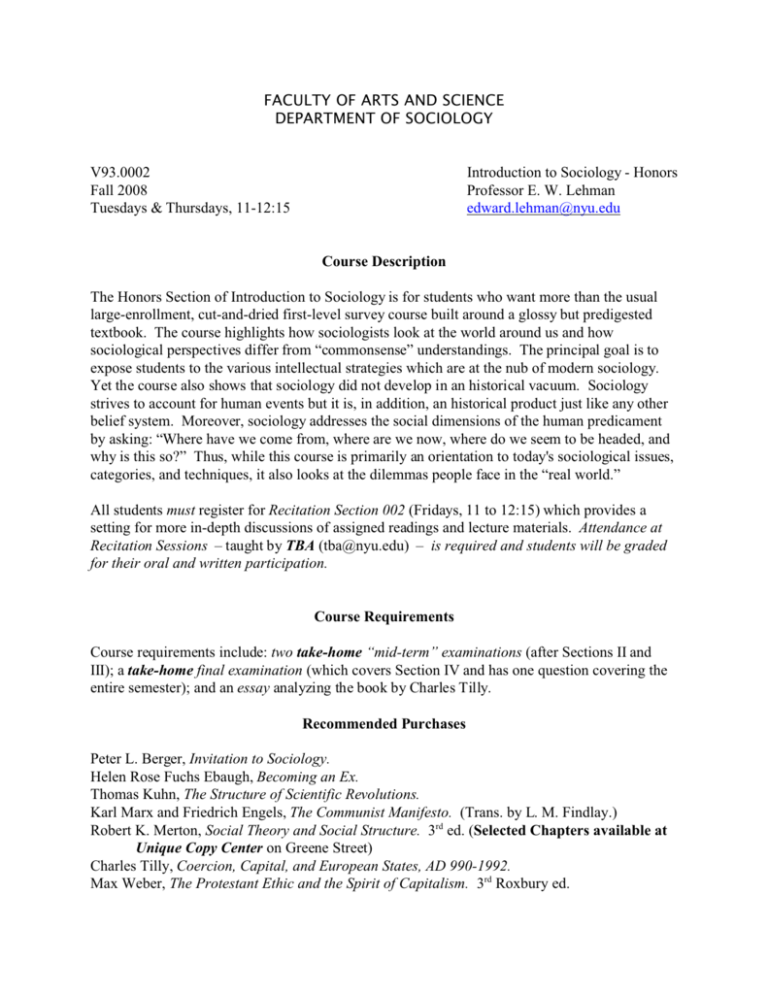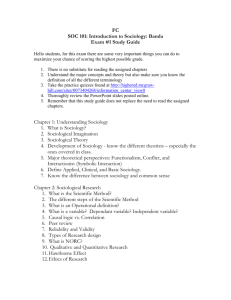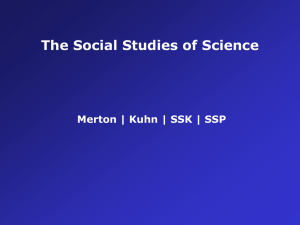FACULTY OF ARTS AND SCIENCE DEPARTMENT OF
advertisement

FACULTY OF ARTS AND SCIENCE DEPARTMENT OF SOCIOLOGY V93.0002 Fall 2008 Tuesdays & Thursdays, 11-12:15 Introduction to Sociology - Honors Professor E. W. Lehman edward.lehman@nyu.edu Course Description The Honors Section of Introduction to Sociology is for students who want more than the usual large-enrollment, cut-and-dried first-level survey course built around a glossy but predigested textbook. The course highlights how sociologists look at the world around us and how sociological perspectives differ from “commonsense” understandings. The principal goal is to expose students to the various intellectual strategies which are at the nub of modern sociology. Yet the course also shows that sociology did not develop in an historical vacuum. Sociology strives to account for human events but it is, in addition, an historical product just like any other belief system. Moreover, sociology addresses the social dimensions of the human predicament by asking: “Where have we come from, where are we now, where do we seem to be headed, and why is this so?” Thus, while this course is primarily an orientation to today's sociological issues, categories, and techniques, it also looks at the dilemmas people face in the “real world.” All students must register for Recitation Section 002 (Fridays, 11 to 12:15) which provides a setting for more in-depth discussions of assigned readings and lecture materials. Attendance at Recitation Sessions – taught by TBA (tba@nyu.edu) – is required and students will be graded for their oral and written participation. Course Requirements Course requirements include: two take-home “mid-term” examinations (after Sections II and III); a take-home final examination (which covers Section IV and has one question covering the entire semester); and an essay analyzing the book by Charles Tilly. Recommended Purchases Peter L. Berger, Invitation to Sociology. Helen Rose Fuchs Ebaugh, Becoming an Ex. Thomas Kuhn, The Structure of Scientific Revolutions. Karl Marx and Friedrich Engels, The Communist Manifesto. (Trans. by L. M. Findlay.) Robert K. Merton, Social Theory and Social Structure. 3rd ed. (Selected Chapters available at Unique Copy Center on Greene Street) Charles Tilly, Coercion, Capital, and European States, AD 990-1992. Max Weber, The Protestant Ethic and the Spirit of Capitalism. 3rd Roxbury ed. Course Outline and Readings I. The Sociological Enterprise: Is Sociology a Science? (approximately 2 ½ weeks) Berger, entire book. Merton, Chapters IV and V, pp. 139-171; and Chapter XVIII, pp. 604-15. Kuhn, entire book Jeffrey C. Alexander, “What is Theory?” in Twenty Lectures, pp. 1-21. II. Fundamental Issues: the Problems of Action and Order (approximately 3 weeks) Merton, Chapter XIII, pp. 475-490. D.H. Wrong, “The Oversocialized Conception of Man in Modern Sociology,” American Sociological Review, Vol. 26 (April 1961), pp. 184-193. III. Culture as Structure and Practice: Do Meanings Shape History? (approximately 3 weeks) William H. Sewell, Jr., “The Concept(s) of Culture,” in Bonnell & Hunt (eds.) Beyond the Cultural Turn, pp. 35-61. Weber, entire book. Merton, Chapters XX and XXI, pp. 628-681. A. Etzioni, “Toward a Theory of Public Ritual,” Sociological Theory, Vol. 18 (March 2000), pp. 44-59. IV. The Analysis of Social Structures (approximately 5 ½ weeks) A. Social Identities: Status and Role Merton, Chapter XI, pp. 422-438 only. Ebaugh, entire book. B. Deviance Merton, Chapters VI, pp. 185-214. Howard S. Becker, Outsiders, Chapters 1 and 2, pp. 1- 39. C. Social Structure: Function, Conflict, and Change 2 Merton, Chapter III, pp. 73-138. D. Macrosociology: Inequality and Political Power 1. Dimensions of Inequality Marx and Engels, entire book. 2. The State and Political Power E. W. Lehman, Political Society: A Macrosociology of Politics, pp. 52-54, 80-89. Tilly, entire book. 3








